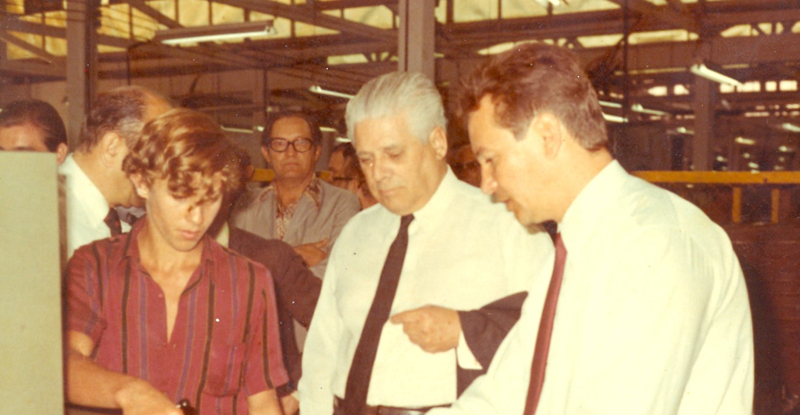Histoire
Werner Ricardo Voigt
"Dans notre vie personnelle et professionnelle, l'honnêteté occupe toujours la première place. Nous ne tirons aucun profit en compromettant un individu"

Descendant d'immigrants allemands de la région de Düsseldorf, Werner Ricardo Voigt est né le 8 septembre 1930. il fut passionné par l'électricité dès sa plus tendre enfance. Werner a également, très jeune, été initié à la lecture grâce à son grand-père, Leo Schulz, constructeur et enseignant qui recevait de nombreuses revues techniques d'Allemagne. L'électricien et musicien Purnhagen fur un autre maître qui influença grandement Werner.
Alors qu'il était adolescent, il s'installa à Joinville, où il étudia à l'école SENAI, tout en travaillant au sein de l'atelier de réparation de Werner Strohmeyer. À l'âge de 18 ans, il fur appeler à servir dans les forces armées à Curitiba. Après son service militaire, il fut l'un des deux soldats choisis pour étudier au sein de l'Institut technique fédéral où il se spécialisa dans la radiotélégraphie et l'électronique.

En septembre 1953, Werner créa un petit atelier de réparation dans le centre-ville de Jaraguá do Sul. La petite entreprise, qui proposait des services généraux et entretenait une douzaine de véhicules pour le secteur de Jaraguá do Sul et ses alentours, prit de l'ampleur, ce qui fit la démonstration de l'esprit d'entreprise du jeune homme, qui, par la suite, allait tirer profit de son talent pour créer l'une des plus grandes entreprises du monde : WEG.
Werner Ricardo Voigt a conçu le prototype d'un moteur qui allait devenir le produit originel de WEG. Un esprit visionnaire et des idées innovantes sont à l'origine de la technologie utilisée au sein de la société. Son leadership technique ne peut être remis en question et son attitude est axée sur l'évolution choisie par WEG, à savoir la modernité de tous les aspects techniques.
En octobre 1988 Décio da Silva, lorsque Décio da Silva fur nommé Président, Werner commença à développer le Conseil d'administration et limita ses fonctions exécutives au sein de la société. En 2008, il créa le Centre de formation éducative et technique Werner Ricardo Voigt dans la ville de Schroeder (État de Santa Catarina), permettant ainsi que jeunes de la région d'apprendre.
Eggon João da Silva
"Les hommes motivés par une idée sont le fondement du succès"

Eggon João da Silva was born on October 17, 1929, where the city of Schroeder is located today. Son of Emílio da Silva and Magdalena da Silva, Eggon was deeply inspired by his father. Emílio was a teacher, photographer, carpenter, musician, trader, among other jobs. He wrote the book "Jaraguá do Sul - A Povoação do Vale do Itapocu", a reference to many scholars of the history of the State of Santa Catarina.
Eggon started working early, at the age of 13, as an auxiliary at a notary office in Jaraguá do Sul and soon gained experience in administration. In 1957, after fourteen years in the main bank of the state, he became partner of João Wiest & Cia., a company specialized in the production of car exhaust pipes, with eight employees then.

Four years later, Eggon left the company, which had 150 employees then, to face the biggest challenge of his career. In September 1961, together with Werner and Geraldo, he founded WEG. Eggon was the president of the company until 1989, leading it to become one of the largest in the sector, with remarkable participation on the domestic and international market. That year, he handed over the position to Décio da Silva.
Eggon's history is not connected only to WEG. The businessman was part of the board of four big companies: Oxford, Tigre, Marisol and Perdigão. In the last one, he was CEO from 1994 to 1995, accomplishing the hard task of recovering the financial situation of the company. In September 2015, at age 85, Eggon João da Silva died of natural causes in a hospital of Jaraguá do Sul.
Geraldo Werninghaus
“We grew because at the very beginning we thought big”

Geraldo Werninghaus was born in the city of Rio do Sul on November 26, 1932. He started his career at Werninghaus & Filhos, the repair shop of his father in Joinville. At age 14, when he started his training as a mechanic, the universe of lathes and milling machines, grease and cotton waste was already part of his daily life.
Geraldo left Werninghaus & Filhos in 1961 and, at the age of 29, and accepted the invitation to found WEG, in Jaraguá do Sul, together with Werner and Eggon. His knowledge of mechanics and his creativity in problem solving combined with the skills of the partners were used to make the company a benchmark in Brazil.

In the manufacturing plant, Werninghaus was in charge of the production. He was considered a leader focused on production and work teams. Dedicated to work and community, when he left the direct executive functions at WEG to go to the board of directors, he began a new and promising public career.
He was councilor, state legislator and mayor of Jaraguá do Sul, with a term of office scheduled to end December 31, 2000. However, on February 10 of 1999, a car accident prematurely ended the career and life of Geraldo Werninghaus.
